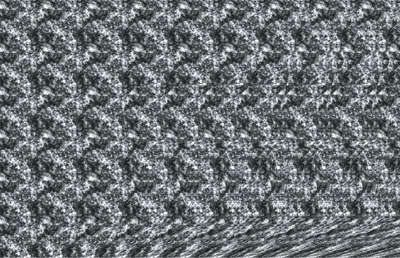Two random-dot displays, each of which alone reveals no structure or form, can reveal a “Cyclopean”, stereoscopic form that is based purely on binocular image disparity. This use of random-dot stereograms was discovered by Bela Julesz of Bell Telephone Laboratories, and is the basis of a variety of autostereograms that have become popular viewing material in recent times. Autostereograms, like the one shown in this Figure, do reveal a somewhat repetitive texture structure; however they also conceal a “Cyclopean” form unless and until the autostereogram is viewed in such a way as to activate binocular-disparity processing mechanisms. If one looks at this Figure and crosses or diverges one"s eyes until the two white squares in the auto stereogram display fuse, horse-like form should eventually become visible. With divergence the horse should appear as an object in front of a background. With crossing of eyes, it should appear like a horse-shaped hole in a foreground.
»Stereodepth«
by Béla Julesz
| i |

| creators: | Béla Julesz |
| title: | Stereodepth |
| year: | 1971 |
| material: |
painting, b/w, computer-aided |
| artwork type: | painting |
Description
Artists
Illustrations
Comments
enter new comment

